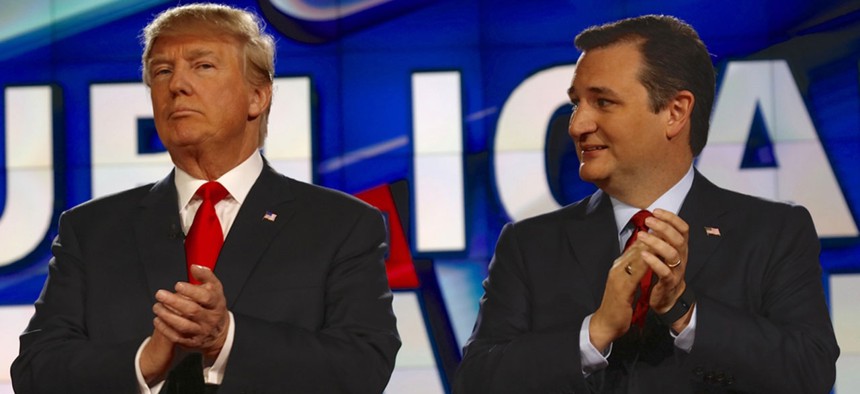
Joseph Sohm/Shutterstock.com
A Time for Culling, Not for Winning
Take a deep breath: Iowa and New Hampshire won’t decide the nominations
It’s now less than a week before the Iowa caucuses, two weeks before the New Hampshire primary, and thus time for political aficionados to whip themselves into frenzy. People often become so preoccupied with the two contests that they lose sight of the larger picture. So take a deep breath, everyone: Neither party’s nomination is likely to be settled by the outcomes in Iowa or New Hampshire, or even the two combined. The Republican race is likely to be determined much closer to Memorial Day than New Year’s Day, and the Democratic nomination should be obvious by Easter, quite possibly much sooner, but not likely in February.
Iowa should winnow the more conservative half of the GOP field, likely ending the campaigns of Mike Huckabee, Rand Paul, and Rick Santorum and allowing Ted Cruz to consolidate the more strongly ideological wing of the party. Conversely, New Hampshire is likely to cull the herd of conventional Republican candidates—Jeb Bush, Chris Christie, John Kasich, and Marco Rubio. All are not likely to remain contenders after the Granite State votes.
The only question is whether New Hampshire will push one or two of the conventional candidates from the race, or even three if there is a big gap between the first-place establishment candidate and the runner-up. Thus the results and fallout from Iowa and New Hampshire should provide a lot more clarity to a race in which Republicans were faced with a dizzying array of choices, much like a kid walking into Baskin-Robbins for the first time.
While it is easy to see this GOP race quickly becoming a contest between populist Trump, conservative Cruz, and an establishment candidate to be determined by the end of February (after South Carolina and Nevada), that three-way race could go deep into May or June, or even to the July convention in Cleveland. While I thought I would never live to see a contested convention, this race has the ingredients to prove me wrong. (But let’s not use the term “brokered convention” because there are no brokers left anymore. Party elders and leaders have lost their sway over independent-minded delegates.)
With only three Democrats running, there is little herd to cull. Suffice it to say that Martin O’Malley will be gone before President’s Day weekend. More telling will be whether Sanders has succeeded in expanding his support beyond millennials and white liberals. While Sanders seems to be succeeding in winning over the younger part of the Obama coalition, he has not yet made inroads with African-American and Latino voters, who are crucial in states more diverse than Iowa and New Hampshire. To break out beyond New England and the caucus states, Sanders has to draw a much wider swath of support.
While Washington was being buried by snow, The New York Times heated up the race with its story reporting that Michael Bloomberg was seriously considering an independent bid for president. While it is no secret that Bloomberg has long wanted to run for president and thinks he would be an effective chief executive (as do many others), he is a pragmatist and has no desire to be a spoiler. He would run only if he saw a realistic path to winning.
The challenge for Bloomberg or any independent is that there is a structural barrier to winning a three-way race. Even assuming that an independent candidate had a powerful message, a great campaign, and plenty of money, winning a majority of the Electoral College votes would be nearly impossible. Assuming the Electoral College did not produce a winner, the election would then be thrown into the House of Representatives, with each state getting a single vote. Since Republicans hold a majority of votes in 34 state delegations, how could an independent, or a Democrat for that matter, win? One of the major-party nominees would have to completely collapse before an independent could win.
While Bloomberg is a very serious guy, don’t hold your breath for him to actually get into the race unless one party nominates someone so weak that he or she cannot even carry the states that represent the party’s base, a highly unlikely eventuality. If Bloomberg gets into the race, look carefully to see how circumstances have changed. They would have had to change a lot before he or any other independent candidate could realistically hit 270 Electoral College votes.
(Image via Joseph Sohm / Shutterstock.com )






